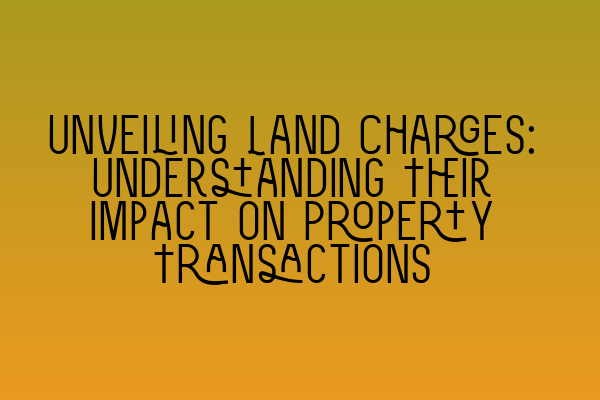Unveiling Land Charges: Understanding Their Impact on Property Transactions
When it comes to property transactions in the UK, it is crucial to have a comprehensive understanding of land charges. Land charges are legal encumbrances or rights that can affect a property and its ownership. They can have a significant impact on the buying, selling, or mortgaging of a property. In this article, we will delve into the intricacies of land charges and their implications on property transactions.
What are Land Charges?
Land charges are legal interests or rights that are registered against a property. They indicate that there are certain restrictions or obligations associated with the property’s ownership. These charges are typically registered with the Land Charges Department of the HM Land Registry.
There are various types of land charges, including:
- Updates in UK Property Laws: Key Changes and Implications
- Legal challenges in property transactions: A comprehensive guide
- Navigating Lease Laws in the UK: Essential Guidelines for Tenants and Landlords
- Dominate Property Law Questions: Avoiding Common Pitfalls
- Land Law Revision Tips: Ace Your Exam Preparation
Impact on Property Transactions
Land charges can significantly impact property transactions, affecting the process, timelines, and even the future use of a property. Here are some key considerations:
1. Restrictive Covenants
Restrictive covenants are agreements that limit the use or development of a property. They are often imposed by the original developer to maintain the aesthetics or overall character of a development. These covenants can restrict activities such as building extensions, operating certain businesses, or even hanging laundry outside. Buyers and sellers must be aware of any restrictive covenants associated with a property as they can limit future plans.
2. Easements and Rights of Way
An easement is a right that allows someone to use part of another person’s land for a specific purpose. Common examples of easements include rights of way, which grant access to a property through another person’s land. It is essential to identify and understand any existing easements or rights of way to ensure smooth access to a property and avoid potential conflicts.
3. Mortgages and Charges
When purchasing a property with a mortgage, the lender will often register a charge on the property. This charge secures the lender’s interest in the property until the mortgage is repaid. It is crucial for buyers and sellers to be aware of any existing charges on a property, as they can affect the transfer of ownership and financing arrangements.
4. Notices and Restrictions
Notices and restrictions are registered on the title of a property to alert potential buyers or lenders of certain issues. These can include bankruptcy restrictions, planning restrictions, or even notices relating to upcoming developments in the vicinity. Buyers should carefully review these notices and restrictions to assess any potential impact on their plans for the property.
Managing Land Charges
With the complex nature of land charges, it is crucial to seek legal advice and guidance to navigate property transactions effectively. A solicitor specializing in property law can help uncover and understand any existing land charges, negotiate their impact, and ensure compliance with legal requirements.
By working with an experienced solicitor, you can:
- Evaluate the implications of restrictive covenants on your property
- Ensure that easements and rights of way are properly documented
- Negotiate with lenders and manage charges associated with your mortgage
- Assess the impact of notices and restrictions on your property
Remember, property transactions involve substantial financial investments, and understanding land charges is essential to protect your interests and avoid potential legal issues.
To learn more about property law and land law, check out our related articles:
- Updates in UK Property Laws: Key Changes and Implications
- Legal challenges in property transactions: A comprehensive guide
- Navigating Lease Laws in the UK: Essential Guidelines for Tenants and Landlords
- Dominate Property Law Questions: Avoiding Common Pitfalls
- Land Law Revision Tips: Ace Your Exam Preparation
For professional legal support and advice on property law, contact SQE Property Law & Land Law. We have a team of experienced solicitors ready to assist you in your property-related matters. Schedule a consultation today!
